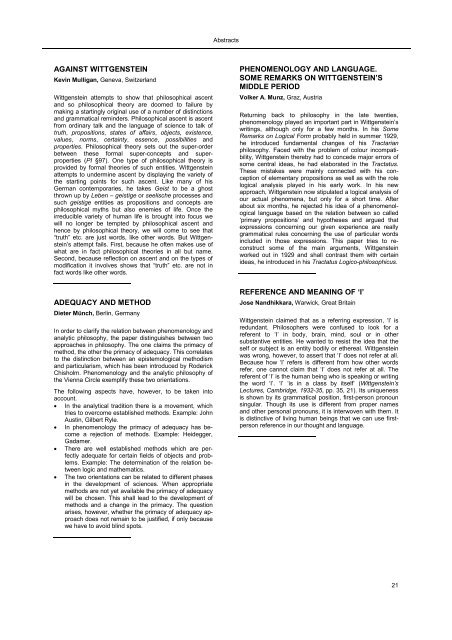Erfahrung und Analyse Experience and Analysis - Austrian Ludwig ...
Erfahrung und Analyse Experience and Analysis - Austrian Ludwig ...
Erfahrung und Analyse Experience and Analysis - Austrian Ludwig ...
You also want an ePaper? Increase the reach of your titles
YUMPU automatically turns print PDFs into web optimized ePapers that Google loves.
AGAINST WITTGENSTEIN<br />
Kevin Mulligan, Geneva, Switzerl<strong>and</strong><br />
Wittgenstein attempts to show that philosophical ascent<br />
<strong>and</strong> so philosophical theory are doomed to failure by<br />
making a startingly original use of a number of distinctions<br />
<strong>and</strong> grammatical reminders. Philosophical ascent is ascent<br />
from ordinary talk <strong>and</strong> the language of science to talk of<br />
truth, propositions, states of affairs, objects, existence,<br />
values, norms, certainty, essence, possibilities <strong>and</strong><br />
properties. Philosophical theory sets out the super-order<br />
between these formal super-concepts <strong>and</strong> superproperties<br />
(PI §97). One type of philosophical theory is<br />
provided by formal theories of such entities. Wittgenstein<br />
attempts to <strong>und</strong>ermine ascent by displaying the variety of<br />
the starting points for such ascent. Like many of his<br />
German contemporaries, he takes Geist to be a ghost<br />
thrown up by Leben – geistige or seelische processes <strong>and</strong><br />
such geistige entities as propositions <strong>and</strong> concepts are<br />
philosophical myths but also enemies of life. Once the<br />
irreducible variety of human life is brought into focus we<br />
will no longer be tempted by philosophical ascent <strong>and</strong><br />
hence by philosophical theory, we will come to see that<br />
“truth” etc. are just words, like other words. But Wittgenstein’s<br />
attempt fails. First, because he often makes use of<br />
what are in fact philosophical theories in all but name.<br />
Second, because reflection on ascent <strong>and</strong> on the types of<br />
modification it involves shows that “truth” etc. are not in<br />
fact words like other words.<br />
ADEQUACY AND METHOD<br />
Dieter Münch, Berlin, Germany<br />
In order to clarify the relation between phenomenology <strong>and</strong><br />
analytic philosophy, the paper distinguishes between two<br />
approaches in philosophy. The one claims the primacy of<br />
method, the other the primacy of adequacy. This correlates<br />
to the distinction between an epistemological methodism<br />
<strong>and</strong> particularism, which has been introduced by Roderick<br />
Chisholm. Phenomenology <strong>and</strong> the analytic philosophy of<br />
the Vienna Circle exemplify these two orientations.<br />
The following aspects have, however, to be taken into<br />
account.<br />
In the analytical tradition there is a movement, which<br />
tries to overcome established methods. Example: John<br />
Austin, Gilbert Ryle.<br />
In phenomenology the primacy of adequacy has become<br />
a rejection of methods. Example: Heidegger,<br />
Gadamer.<br />
There are well established methods which are perfectly<br />
adequate for certain fields of objects <strong>and</strong> problems.<br />
Example: The determination of the relation between<br />
logic <strong>and</strong> mathematics.<br />
The two orientations can be related to different phases<br />
in the development of sciences. When appropriate<br />
methods are not yet available the primacy of adequacy<br />
will be chosen. This shall lead to the development of<br />
methods <strong>and</strong> a change in the primacy. The question<br />
arises, however, whether the primacy of adequacy approach<br />
does not remain to be justified, if only because<br />
we have to avoid blind spots.<br />
Abstracts<br />
PHENOMENOLOGY AND LANGUAGE.<br />
SOME REMARKS ON WITTGENSTEIN’S<br />
MIDDLE PERIOD<br />
Volker A. Munz, Graz, Austria<br />
Returning back to philosophy in the late twenties,<br />
phenomenology played an important part in Wittgenstein’s<br />
writings, although only for a few months. In his Some<br />
Remarks on Logical Form probably held in summer 1929,<br />
he introduced f<strong>und</strong>amental changes of his Tractarian<br />
philosophy. Faced with the problem of colour incompatibility,<br />
Wittgenstein thereby had to concede major errors of<br />
some central ideas, he had elaborated in the Tractatus.<br />
These mistakes were mainly connected with his conception<br />
of elementary propositions as well as with the role<br />
logical analysis played in his early work. In his new<br />
approach, Wittgenstein now stipulated a logical analysis of<br />
our actual phenomena, but only for a short time. After<br />
about six months, he rejected his idea of a phenomenological<br />
language based on the relation between so called<br />
‘primary propositions’ <strong>and</strong> hypotheses <strong>and</strong> argued that<br />
expressions concerning our given experience are really<br />
grammatical rules concerning the use of particular words<br />
included in those expressions. This paper tries to reconstruct<br />
some of the main arguments, Wittgenstein<br />
worked out in 1929 <strong>and</strong> shall contrast them with certain<br />
ideas, he introduced in his Tractatus Logico-philosophicus.<br />
REFERENCE AND MEANING OF ‘I’<br />
Jose N<strong>and</strong>hikkara, Warwick, Great Britain<br />
Wittgenstein claimed that as a referring expression, ‘I’ is<br />
red<strong>und</strong>ant. Philosophers were confused to look for a<br />
referent to ‘I’ in body, brain, mind, soul or in other<br />
substantive entities. He wanted to resist the idea that the<br />
self or subject is an entity bodily or ethereal. Wittgenstein<br />
was wrong, however, to assert that ‘I’ does not refer at all.<br />
Because how ‘I’ refers is different from how other words<br />
refer, one cannot claim that ‘I’ does not refer at all. The<br />
referent of ‘I’ is the human being who is speaking or writing<br />
the word ‘I’. ‘I’ ‘is in a class by itself’ (Wittgenstein’s<br />
Lectures, Cambridge, 1932-35, pp. 35, 21). Its uniqueness<br />
is shown by its grammatical position, first-person pronoun<br />
singular. Though its use is different from proper names<br />
<strong>and</strong> other personal pronouns, it is interwoven with them. It<br />
is distinctive of living human beings that we can use firstperson<br />
reference in our thought <strong>and</strong> language.<br />
21












